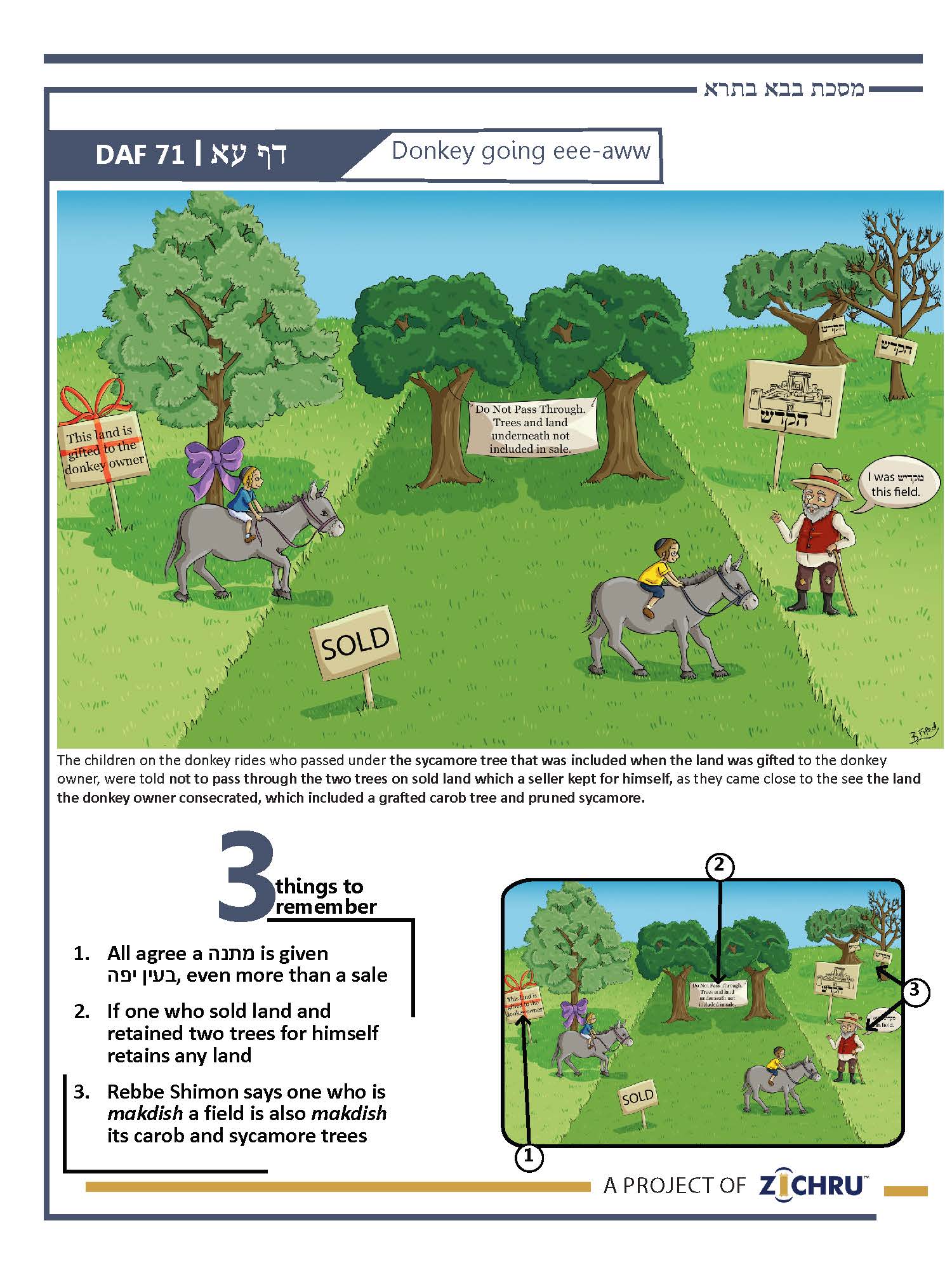Bava Basra - Daf 71
- Audio Timestamps
0:00 - The 3 Sugyos
2:46 - Review of 3 Sugyos
5:25 - Siman
7:33 - 4 Blatt Back Chazarah
15:22 - Pop Quiz (Last 7 blatt)
For access to all Zichru resources including PDFs, and illustrations CLICK HERE
- All agree a מתנה is given בעין יפה, even more than a sale
The next Mishnah states that one who sells a field, even if he sells “it and everything in it,” does not include its pit, winepress, or dovecote. It then records the machlokes if the seller must purchase a דרך for such assets. The Mishnah continues that all the exclusions from sales taught thus far are specific to sales, אבל בנותן מתנה – but with one giving a gift, נותן את כולה – he gives it entirely. Even items which are not included in a sale by the term “it and everything in it,” such as carob and sycamore trees, pits, etc. are included with a gift. This is because all agree that a gift is given בעין יפה, and even more generously than a sale is according to Rebbe Akiva, who holds every sale is made בעין יפה. When brothers divide an estate, זכו בשדה זכו בכולה – when they acquire a field in the division, they acquire it fully, including everything usually excluded from sales. The same applies to one who acquires the estate of a גר who died without heirs.
- If one who sold land and retained two trees for himself retains any land
Rav Huna said that although one who bought two trees in someone’s field does not acquire any land (whereas a purchase of three trees constitutes a field of trees, and the buyer acquires land under and around them), מכר קרקע ושייר שני אילנות לפניו – still, if one sold land and retained two trees there for himself, יש לו קרקע – he has the land beneath and around them. Even according to Rebbe Akiva, that a sale is made בעין יפה – generously, that is only in cases like where he retains pits, דלא קא מכחשי בארעא – which do not harm the ground surrounding them (and the buyer can use his own property fully), אבל אילנות דקא מכחשי בארעא – but trees, which harm the surrounding ground, the seller retains the land beneath and around the trees, because if he does not, the buyer could tell him when the trees die: עקור אילנך שקול וזיל – “Uproot your tree; take it and go!”
- Rebbe Shimon says one who is makdish a field is also makdish its carob and sycamore trees
The Gemara questions the assertion that Rav Huna’s ruling is even according to Rebbe Akiva. In the Mishnah, Rebbe Shimon said that if one is makdish a field, לא הקדיש אלא חרוב המורכב וסדן השקמה – he was only makdish (from assets normally excluded from a sale) a grafted carob tree and a pruned sycamore (and not everything else, as the Chochomim say). In a Baraisa, Rebbe Shimon explains why these trees are included: הואיל ויונקין משדה הקדש – because they are nourished from a field of hekdesh. This proves that Rebbe Shimon holds one who sells land and retains trees does not retain their land, because if he does, כי קא ינקי מדנפשיה קא ינקי – when [these trees] are being nourished, they are being nourished from his own land, not land of hekdesh!? Therefore, the Gemara concedes (at this point) that Rebbe Akiva, who holds מוכר בעין יפה מוכר, holds the same when one retains trees, and Rebbe Shimon follows his opinion. Rav Huna, who says the seller retains the trees’ land, follows the Rabbonon, that a sale is made בעין רעה. He teaches that even after the trees die, the seller retains the right to plant new trees in their place. On Daf 72, this explanation of Rebbe Shimon is disproven, and the Gemara will revert to its original understanding of Rav Huna’s ruling.
Siman – Donkey going eee-aww
The children on the donkey rides who passed under the sycamore tree that was included when the land was gifted to the donkey owner, were told not to pass through the two trees on sold land which a seller kept for himself, as they came close to the see the land the donkey owner consecrated, which included a grafted carob tree and pruned sycamore.


